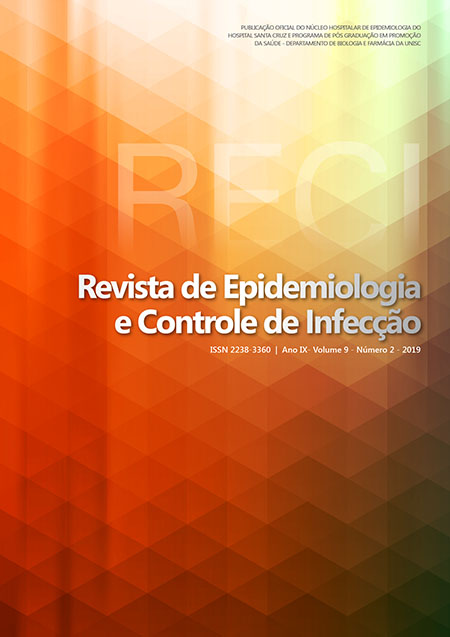Epidemiological profile of the dengue cases notified in Ceres-Goiás, from 2014 to 2015
DOI:
https://doi.org/10.17058/reci.v9i2.11396Abstract
Background and Objectives: The description of the epidemiological profile is an important tool in the search for effective solutions regarding, in particular, to infectious diseases and alternatives for improving public health, and it is an instrument for the development of policies appropriate to local realities. This article aims to describe the epidemiological profile of dengue cases notified to the Ceres-GO Municipal Health Department (SMS) from 2014 to 2015. Methods: This is a cross-sectional, observational, descriptive study, developed through investigation and data interpretation of the Compulsory Dengue Notification System. The information collected was typed into a database, where the types of distribution of each variable (quantitative and qualitative) were evaluated and distributed as tables, with a calculation of incidence rates per 100 thousand inhabitants. The variables studied included socio demographic data and laboratory data collected from March to May 2017. Results: A total of 3,374 possible cases of dengue in the municipality of Ceres-GO were reported during 2014 and 2015, of which 189 referring to 2014 and 3185 to 2015, where the incidence rate per 100 thousand inhabitants was 868 and 14,537 respectively. Comparing the records of the respective years, a significant increase of notifications is observed, representing a 16 times growth from one year to the other. Conclusion: Several aspects show the severity of dengue, where the inadequacy of various factors contributes to greater population involvement. Inadequate management and ineffective case management result in progression of the disease, leading to its rapid evolution, often leading to death. Keywords: Dengue. Epidemiological profile. Public health. Compulsory notificationDownloads
Downloads
Published
How to Cite
Issue
Section
License
The author must state that the paper is original (has not been published previously), not infringing any copyright or other ownership right involving third parties. Once the paper is submitted, the Journal reserves the right to make normative changes, such as spelling and grammar, in order to maintain the language standard, but respecting the author’s style. The published papers become ownership of RECI, considering that all the opinions expressed by the authors are their responsibility. Because we are an open access journal, we allow free use of articles in educational and scientific applications provided the source is cited under the Creative Commons CC-BY license.


